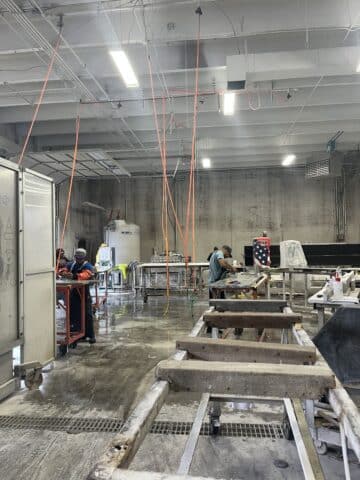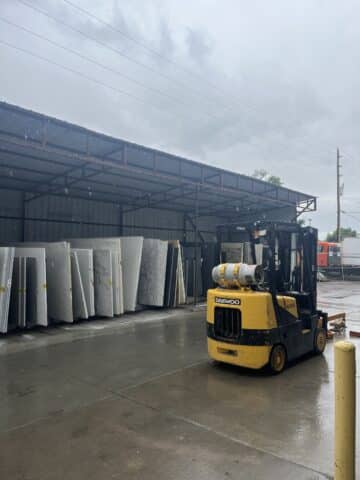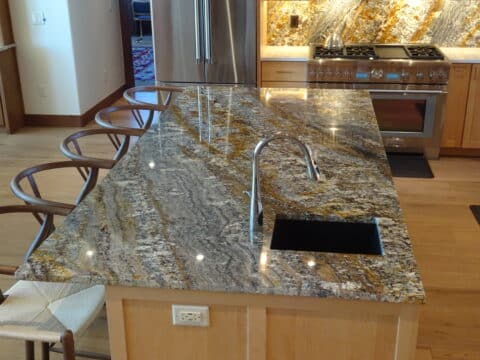Granite Fabrication
All stone slabs are difficult to cut and fabricate. It is an intricate and tedious process that requires a team of professionals who have the experience and knowledge of working with the type of stone you are looking to use in your design. Not all stones are the same and may have limitations when it comes to their fabrication.
Granite undergoes the same fabrication as most natural stones. Prior to your granite’s fabrication, the slab must be inspected for any blemishes or major incidents. If the slab passes inspection, it can then prepare for fabrication. This process involves designing, cutting and reshaping quarried slabs of granite into countertops and other applications.
What Do Granite Fabricators Do?
A granite fabricator uses a design template to recreate and translate a design into your stone slab. The stone fabricator reshapes stone slabs and remnants by sizing and cutting the stone to fit exact measurements and specifications of your application.
There are many intricate tasks and responsibilities that fabricators must follow when it comes to handling stones such as granite. Granite is extremely heavy and can be dangerous to those in close proximity during this phase. It’s extremely important that fabricators take safety measures by wearing safety gear and knowing how to operate the machinery being used.
Not only this, but even a small mistake can crack or break your stone. Natural stone slabs are one of a kind and cannot be replicated. You should consider recruiting an experienced team of fabricators who are qualified for the type and scope of stone fabrication your project entails. If done right the first time, your granite countertops should last for years to come.
How are Granite Counters Fabricated?

What Do Granite Fabricators Do?
Stones such as granite are quarried into large slabs that can be used for applications such as countertops. Fabricators take these slabs and reshape them by using special tools and machinery to transform them into a countertop surface.
In order to create granite countertops, a granite slab must undergo an extensive fabrication process.
Granite Slab Inspection
Prior to your granite or stone countertop’s fabrication, the slab must undergo inspection. Inspection is important because it allows fabricators to predict how a slab may react during fabrication, avoid any complications that may arise, and determine its best appearance.
Inspection involves taking a close look at the entire surface area of the slab to identify if there are any cracks, fissures, divots, blemishes or other potential harm that can be problematic during fabrication or damaging to your granite countertop surface. If there are no major incidents, the slab can still be used, and any small blemishes can be marked and cut around. Some are very fragile and require extra precautions to avoid breaks or cracks during this process. Understanding how different slabs may react under fabrication is important.
Not only this, but every granite slab is different. Veining, speckle, color, and patterns vary. This is why customers are often able to determine which focal points of the slab they want to be in their design and make judgments for how they want their stone to lay. Some parts of the slab may be busy and bold while other parts are more subtle.
Textured Finishes for Granite
As part of fabrication, your granite slab is given a textured finish. All natural stones, such as granite, can have just about any finish done to them. Finishes for your stone slab include:
- Leathered
- Honed
- Polished
Some slabs come with a finish on them already. Others can have a finishing treatment of your choice done to them for an additional charge. The edging for your slab is also given the same finish as the rest of it to ensure it matches and has a seamless look. Having a finishing treatment applied typically takes about a week. The slab is sent out to professionals who apply the textured finish and is then sent back before starting the actual fabrication process.
The Fabrication Process for Granite Counters

Granite Countertop Fabrication
Granite, like any stone, is extremely vulnerable during its fabrication process and requires special equipment to move, shape, cut, wash, and seal. The steps involved during the fabrication process for granite counters includes:
- Picking your granite
- Measuring and templating
- Cutting and shaping
- Finishing touches
Picking Out Your Granite Slab
Granite is a natural stone that is formed from natural elements and minerals in the earth. For this reason, every granite slab is different, and its mineral makeup varies. You should take the time to pick out your granite slab by hand and in person.
The variations are limitless, and it may take time to find a slab you want. There is a supplier with the exact slab of granite you envisioned, you just have to find it.
Taking Measurements and Creating a Template Layout
Measurements are critical for fabricating your stone’s design. A stone templator is sent to your home to take measurements of where the stone will be installed. They must mark any cut-outs, consider overhang on the counter, and mark any other preparations prior to fabrication.
The templator is responsible for taking exact measurements that will then be used to articulate a template layout for your stone slab. The template acts as an exact replica of the space the stone is being designed to fit. The unique measurements from the template are then used and programmed into special stone cutting machinery.
If your granite or stone slab is not cut to the exact dimensions of your application, it can delay your project or even result in the slab becoming unusable for your project. This is why
templators must take multiple and exact measurements of the stone prior to it being cut.
Cutting and Shaping Granite Countertops
Once measurements have been taken and the template is created for your granite’s layout, it can begin to undergo the actual fabrication phase. When cutting and shaping your stone, the most important part is the equipment that is being used. Specialized equipment and machinery are essential to create clean cuts and edges for your granite countertop or application. In addition, any cut-outs for your countertop or surface such as cooktops, undermount sinks, holes for faucets or plug ins are made during this phase.
Using the template created for your granite’s design, the dimensions are then programmed into a CNC (Computer Numerically Controlled) machine. This is a special machine for cutting large stone slabs and remnants. It’s important that the fabricator inputs the correct specifications so that the design and cut-outs for your granite are accurately translated to the CNC machine.
The CNC machine is also able to fabricate an edge profile for your slab. This advanced technology has allowed fabricators to achieve any edge profile you choose, depending on your slab’s working characteristics.
This type of high tech and advanced machinery is what sets apart a professional fabricator.
Finishing Touches and Quality Control

Granite Kitchen Countertop
Finally, once your granite is cut and shaped into its final specifications, it is given a few finishing touches. After undergoing fabrication, some parts of the slab, especially around cut-outs, may be thin and are not as strong as the larger surface area. The fabricator should examine the slab to ensure it is up to quality and make any improvements they find necessary.
The slab is then washed and dried of any debris and its edges are smoothed and polished. Once your slab is shiny and edges are uniform, it is ready to be sealed. A sealant protects your granite from liquids and debris to increase its longevity.
Once your slab passes quality control and the final touches are made, your granite is ready for installation.
Are Granite Counters Buffed as Part of Fabrication?
Any buffing or polishing that is needed for your granite is done as part of the fabrication phase. However, buffing is rarely needed for the actual slab unless there is a scuff or significant mark. Most slabs from the quarry already come with the face of the slab polished, so it does not need to be buffed or polished again. Instead, fabricators primarily focus on polishing and smoothing the edges of your stone.
Finding a Granite Fabricator
Fabricators are as good as the company they work for. A reputable and transparent company that follows regulations and guidelines put in place for fabricators ensures your stone will be handled properly. You should always do your research when finding a fabricator because not all fabricators can achieve the result you want. Seek a legitimate company that aims for quality and perfection.
Fabrication Services Provided by Granite and Marble Designs
Granite and Marble Designs provides the best granite fabrication services in Denver and the surrounding area. There are many fabricators, but what makes us different is having the knowledge of what we are working with and using the right tools and equipment to properly handle your stone slab.
Years of experience, along with trial and error, have taught us this. We know that we cannot treat each stone or product the same, and we never let our guard down. We use specialized equipment and a high end SABERjet CNC machine to perfect your slab’s fabrication. Each of our experienced professionals in the shop has at least 5 years of experience in the industry, and our team has over 100 years of experience combined.
Granite and Marble Designs has what it takes to fabricate your granite countertops and achieve the exceptional outcome you desire. Request a free quote or call 303-551-6000 to schedule a time to browse our warehouse.
